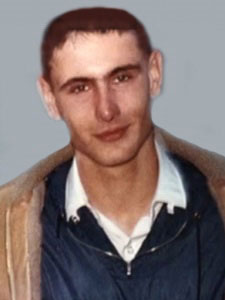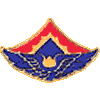| |
|
|
|
Glenn Urban Andreotta
Specialist Four
B CO, 123RD AVN BN, 16TH AVN GROUP, AMERICAL DIV, USARV Army of the United States St Louis, Missouri October 30, 1947 to April 08, 1968 GLENN U ANDREOTTA is on the Wall at Panel 48E, Line 50 See the full profile or name rubbing for Glenn Andreotta |
  |

|



| |
|
This man was one of the good guys at My Lai. He along with Hugh Thompson Jr. and Lawrence Colburn rescued civilians at My Lai. In 1998 he was posthumously awarded the Soldier's medal as were Thompson and Colburn.
Gary Goeckel |
|
I have been inspired by your story. God bless you and your family.
From someone who wishes to be anonymous. |
A Note from The Virtual WallOn 08 Apr 1968 an OH-6A (tail number 69-16023) from B Company, 123rd Aviation Battalion, was leading two UH-1 gunships on an armed recon mission. The OH-6 was the "low-flyer", picking out targets which then would be attacked by the gunships. On this occasion the OH-6 was hit by enemy .51 caliber fire and crashed. The pilot, 1LT Barry Lloyd, was thrown through the plexiglass windscreen. One of his two crewmen had been killed by gunfire before impact and the second was trapped in the burning wreckage. VC troops approached the wreckage and killed the trapped crewman with rifle fire. They apparently didn't think 1LT Lloyd was worth bothering with; although one VC nudged Lloyd with his foot, Lloyd wasn't killed and was picked up by another helicopter.The two dead crewmen were the gunner, SP5 Charles M. Dutton of Wellsville, New York, and the crew chief, SP4 Glenn U. Andreotta. Both men had been assigned to the 161st Assault Helicopter Company before being reassigned to B Company, 123rd Avn. While with the 161st AHC, SP4 Andreotta was one of the helicopter crew who tried to stop the slaughter of civilians at My Lai on 16 March 1968. As noted above, the three men who made that attempt - then-WO Hugh C. Thompson, SP4 Lawrence Colburn, and SP4 Andreotta - have been awarded the Soldier's Medal for their actions at My Lai. Mr. Thompson died of cancer 06 January 2006.
The pilot, Hugh C. Thompson Jr., and Lawrence Colburn, door gunner of an Army scout helicopter supporting an infantry operation in Quang Ngai Province, South Vietnam, received Soldiers Medals.
The Soldiers Medal will be awarded the family of crewchief Glenn U. Andreotta, who was later killed in action during the war.
Thompson was a warrant officer at the time, and Coburn and Andreotta were specialists fourth class.
Thompson and Colburn stood side by side during the outdoor ceremony near the Vietnam Veterans Memorial as citations for the medal were read by Maj. Gen. Michael W. Ackerman. Ackerman, commander of Fort Gordon and the U.S. Army Signal Center there, presented Thompson and Colburn with awards that reflected them saving 11 Vietnamese villagers from American soldiers.
Ackerman, who commanded a gunship platoon in the Americal Division two years after the events for which Thompson, Colburn and Andreotta were being honored, praised them as embodying the best of Army values and for "setting the standard" on a day that was "one of the most shameful chapters in the Army's history."
"Four Hours at My Lai", a book by Michael Bolton and Kevin Sim, estimated the number of Vietnamese killed to be around 500, mostly women, children and old men. They described the murders as taking place "part maniacally, part methodically," and accompanied by other cruelties.
After My Lai was exposed, Ackerman said, Army leadership took action to make sure such an event would never happen again. "And it has not happened again," he said.
The awarded medals replace the Distinguished Flying Cross that Thompson earlier received and the Bronze Star medals awarded to Colburn and Andreotta. Those awards were premised on the crew having saved villagers during combat with the enemy, rather than from American troops.
Citations read at the ceremony described how on March 16, 1968, Thompson, Colburn and Andreotta saved 10 civilians "during the unlawful massacre of noncombatants by American forces" by placing themselves between the American soldiers and the fleeing villagers.
The observation helicopter was present to draw fire from the Viet Cong, but did not receive any fire. They observed U.S. soldiers apparently firing on Vietnamese noncombatants, women and children. Thompson landed and spoke to a lieutenant to find out what was going on and then argue with him about what was occurring, according to Bilton and Sim's book.
They took off but then landed again. According to Thompson's citation, he placed his helicopter between a group of soldiers and civilians they were pursuing "to prevent their murder. He then personally confronted the leader of the American ground troops and was prepared to open fire on those American troops should they fire upon the civilians." Colburn and Andreotta trained their weapons on the American troops as Thompson confronted the soldiers. Thompson then went forward of the U.S. lines to coax the frightened villagers out of a bunker where they had sought refuge and the crew helped facilitate their evacuation.
Leaving the area, the three observed movement in a pile of execution victims. Landing again, Andreotta rescued a child from the pile, who was evacuated to a nearby hospital.
Thompson's radio reports of the massacre and a subsequent report to his section leader and commander finally brought about a cease-fire order "and the end to the killing of innocent civilians."
Thompson and Colburn later testified at courts- martial resulting from what would later be known at the My Lai Massacre. Lt. William L. Calley Jr., a platoon leader, was court-martialed and convicted on 22 counts of premeditated murder, for which he spent three years of a five-year sentence under house arrest. Other officers were censured and demoted for their part in the subsequent cover-up, but Company Commander Capt. Ernest Medina was found not guilty. Army Chief of Staff Gen. William S. Westmoreland ordered an investigation that was completed by Lt. Gen. W.R. Peers in 1969.
Ackerman quoted the Peers report's assessment of Thompson: "If there was a hero at My Lai, he was it." Colburn at that point turned toward Thompson and beamed with pride for his comrade. "This is really his day," Colburn said to some in the long line of well-wishers who congratulated the two after the medal presentation.
Army Chief of Chaplains Maj. Gen. Donald W. Shea led off the ceremony, praising the actions of the recognized individuals. "We're here to recognize three soldiers for their solemn heroism ... on hallowed ground. Their heroism symbolizes all that we hold good and true," he said.
Ackerman said it was appropriate that the ceremony be held adjacent the Vietnam Memorial, the Wall, which he called a "place of healing."
"The soldiers here today ... stood tall during a time of great introspection for our country," he continued. "The Army's enduring values -- loyalty, duty, respect, honor, integrity and personal courage -- ... inspire a sense of purpose necessary to sustain soldiers in difficult times."
Ackerman credited the values with giving Thompson and Colburn "the ability to do the right thing, even at the risk of their personal safety." He added: "They clearly captured the essence of Army values -- courage and the highest standards of moral, personal and ethical conduct. This award is a symbolic affirmation of these long-held Army ideals and is a tribute to these great soldiers."
Ackerman closed by quoting former British Prime Minister Winston Churchill: "'God, grant me that my principal men be men of principle."
Thompson thanked the Army for the award and praised Colburn and Andreotta. He also thanked his family and David Egan, a Clemson University professor and former Army officer who initiated a nine-year, letter-writing campaign that sought to award Thompson the medal.
"I proudly and humbly accept [the award], not only for myself, but for all the men who served their country with honor on the battlefield of Southeast Asia," Thompson said. "And I see many of those great men in the audience today. Welcome home!" Thompson, a native of Stone Mountain, Ga., completed a career in the Army after Vietnam and then worked in Louisiana as a counselor for the Veterans Administration.
Colburn, now a medical-supply salesman in Georgia, followed and also thanked fellow crew members and family
"It is my solemn wish that we all never forget the tragedy and brutality of war," Colburn said before quoting Gen. Douglas MacArthur: "The soldier, be he friend or foe, is charged with the protection of the weak and the unarmed. It's his very existence for being.
The afternoon event took place under blue skies during unseasonably warm weather. The audience, which included U.S. Senators Max Cleland of Georgia and Strom Thurmond of South Carolina, Army leaders, veterans, family members and friends of the medal recipients also attracted tourists who stumbled onto the event while strolling the mall.
Doug Reese, a Vietnam veteran and U.S. Post Office employee who started a Vietnam-centered tourist agency, was one of the spectators at the ceremony. He said the event helped effect a sense of closure for events that happened some 30 years ago.
Seven-year-old North Carolinian Josie Long said that while she didn't understand all the issues involved in the ceremony, she was "happy and proud" of the recognition bestowed on Colburn, who is her godfather.
Wearing a leather jacket with a POW/MIA emblem emblazoned on the back, Vietnam veteran Donald Winrow said he came down from Canada to attend the ceremony. He said the recognition was "long overdue." He added that the trip had allowed him to see the Vietnam Veterans Memorial for the first time, an experience he found very moving.
David Egan, a professor of architecture who has come into the fields of history and ethics through his pursuit of recognition for the heroes of My Lai, was also present for the ceremony and was interviewed by many of the press. "It could only happen in America," he said. In other countries, he said, official secrets acts would have barred the sort of inquiry that Westmoreland and Peers conducted or the reopening of the awards process to honor the men for what they really did. He credited "the many good people who wear the uniform that work in the Pentagon," Egan said. "This is a happy day," he said. "Mission accomplished."
Thompson will travel to Vietnam for the anniversary of the incident, Monday. There he will be reunited with the child whose life he helped saved.
Officer candidates at West Point and elsewhere are being taught with instructional material in which Thompson appears. As an example of Army values at work, Thompson is in contrast to what can -- and did -- happen where discipline and morale is lacking and leadership breaks down.
© dcmilitary.com |
| Contact Us | © Copyright 1997-2019 www.VirtualWall.org, Ltd ®(TM) | Last update 09/12/2019. |